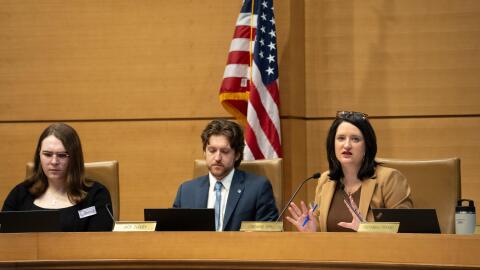PARK RAPIDS — A federal lawsuit alleging Hubbard County law enforcement used excessive force and violated the constitutional rights of a Line 3 protester has been reinstated.
In an opinion filed Sept. 17, the U.S. Court of Appeals for the 8th District reversed an earlier dismissal of the case by a lower court.
Protester Matthew Locke sued Hubbard County Sheriff Cory Aukes and Chief Deputy Scott Parks, along with the county, over their actions at the August 2021 protest of Enbridge’s oil pipeline.
The two used pain compliance techniques to try to get Locke to remove himself from a sleeping dragon device attached to an excavator at a construction site. Sleeping dragons use PVC or metal, chicken wire or rebar and other materials, and protesters typically clip inside them with carabiners. They can only be removed with power tools if protesters don’t comply.
Aukes and Parks applied pressure to pressure points and nerves on Locke’s head and face before an extraction team arrived to remove him, according to court documents.
The lawsuit states that Locke now suffers from facial paralysis, tinnitus and emotional distress.
The lower court threw out the suit, saying Aukes and Parks enjoyed qualified immunity as law enforcement officers, and that Locke failed to state a case for county liability.
Attorney Christine Monta, who represented the appellant, described the force used by officers during oral arguments last October.
"He alleged that the very purpose of these techniques was to cause excruciating pain and that the pain rose to the level of torture," Monta said. "He alleged in the incorporated video that at one point, one of the officers was pushing so hard into his nasal cavity that he began to lose oxygen. And of course, we know that the result of this force was serious injury."
Arguing for the defendants, Attorney Stephanie Angolkar told the appeals court the force was justified because Locke refused to comply with officers while blocking the use of expensive equipment.
"This is interference with a property interest. This is a challenge to the breach of peace and increased conflict and confrontation, with law enforcement placed right in the middle," Angolkar said. "And this was not gratuitous force because something needed to be done to release them."
A majority of the appeals panel agreed that law enforcement’s actions were excessive given the circumstances and disqualified them from immunity.
According to the complaint, Locke did not actively resist arrest, and the circumstances did not justify a greater level of force.
“A reasonable officer would have known that Locke was committing the nonviolent misdemeanors of trespass and obstruction,” the opinion stated, noting these are not serious or severe crimes.
Locke was charged by the Hubbard County Attorney's Office with misdemeanor obstruction, misdemeanor disorderly conduct, gross misdemeanor trespass on a pipeline and felony theft. He pleaded guilty to a single misdemeanor of trespass on a construction site.
In its opinion, the appeals panel questioned whether the felony charge — which Angolkar pointed to several times during arguments — was ever reasonable. Locke was charged under a statute definition of theft "with intent to exercise temporary control only," which "manifests an indifference to the rights of the owner." The criminal complaint alleged the value of the excavator exceeded $5,000, making it a felony.
But the appeals court stated because the theft involved only temporary control, the value should have been determined by the value of the use of the property or any damage caused to the excavator.
"At least one Minnesota court has dismissed for lack of probable cause this same charge against a protestor who had crawled into a pipeline and locked himself to another protestor with a sleeping dragon device," the opinion stated. This case was also in Hubbard County.
Circuit Judge Raymond Gruender dissented from the majority opinion, opining that the officers did not violate a clearly established right. He also wrote that Minnesota law protects public officials from personal liability, unless they are “guilty of a willful or malicious wrong.”
"He [Locke] does not allege that he ever lacked the ability to free himself and admits that sleeping dragon devices are usually removed with power tools. He does not allege that the officers used pain compliance techniques for any purpose other than to effect his arrest," Gruender wrote.
"He does not even allege that the officers appeared to take pleasure in causing pain. This does not constitute a violation of a clearly established right; therefore, the officers are entitled to qualified immunity."
The lawsuit will now return to the district court for further deliberation.
-
Lead for Inclusion in Bemidji will host a book club event for "When Stars Are Scattered" at 4:30 p.m. March 4, 2026, at the Northwest Minnesota Foundation.
-
Warroad, Proctor-Hermantown and Bemidji represented the rural Northland in the girls hockey state tourney. Bemidji was the consolation runners-up.
-
-
The KAXE Music Team highlights new music from Remember Sports, Ancient Cat Society, Altın Gün, Kevin Morby, David Huckfelt & Laura Hugo, Mirah, and Cary Morin.
-
Over 100 student-athletes from rural Northern Minnesota will wrestle at the 2026 state tournament in St. Paul, with a strong representation from the north-central region.
-
Conservationists and wildlife enthusiasts are pleading with the public to demand that protections in the BWCAW concerning mining interests stay in place, with a key vote in Congress pending.
-
High school students whose parents or guardians are cooperative members are invited to submit an essay for a chance to attend the Youth Tour in Washington, D.C., June 1-5, 2026.
-
Advocates said housing instability has intensified in recent months amid the presence of U.S. Immigration and Customs Enforcement agents in Minnesota.
-
Most of the petitions were filed by a newly mobilized army of volunteer lawyers with little or no experience with immigration law.
-
To enter the building, visitors and employees need to pass through a body scanner and put large items through a conveyor belt scanner.




















